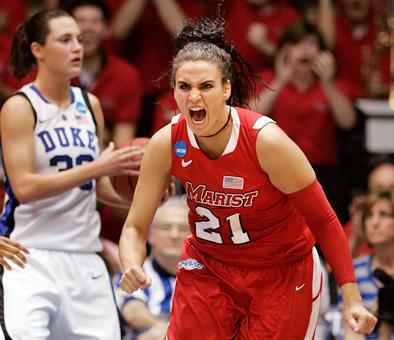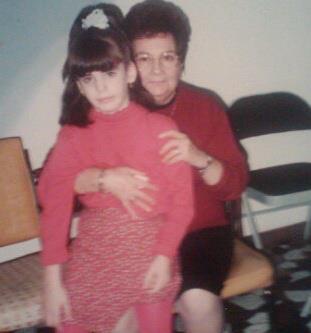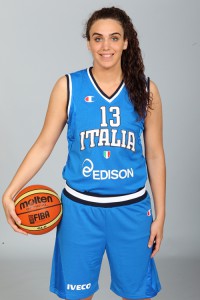When you’re a kid, you have a wild imagination. That imagination takes you places where you didn’t think it was possible. Bill Cosby coined the phrase “kids say the darndest things”. Not many kids when they are younger say they are going to be something and then actually become that something. For one kid, who was born and raised in Bensonhurst, Brooklyn, that imagination became a reality.
Maria Laterza, who I have known since Elementary School, has gone from being a little girl from Brooklyn with a wild imagination to playing for the Italian Women’s National Basketball Team. Not many people can sit there and tell you that they said they were going to do something when they get older and then actually do it, but Maria went against all odds. L’Idea magazine was able to sit down with Maria in her Brooklyn home while visiting from Italy and taking some time off before her season to share how her dream became that reality.

L’Idea Magazine: Tell me how it all started for you. When did you realize you had the potential to be a dominant basketball player?
Maria Laterza: I was in second grade at P.S 177 when I got the flyer about playing CYO basketball at St. Athanasius. You could say I come from an athletic family; my Uncle Vinny was a great soccer player and ran a few NYC marathons, while my older cousin Alana played three years of collegiate sports, basketball being one of them. Though I’m an only child, my older cousins have been tremendous role models for me. Much of my success has come from me trying to basically mimic my cousins’ style. I think a lot of people saw the potential in me to be this dominant athlete before I really saw it in myself. Even though I grew to become one of the top female basketball players in high school in NYC, starting on Bishop Kearney’s varsity as a freshman, scoring 1000 points, having hundreds of colleges banging on my door I still wasn’t convinced, oddly enough. I think for a while I had just wanted to be “normal” like everyone else. I didn’t want to accept the fact that I was different. I mean, how many 6’2 girls are walking around Bensonhurst dribbling a basketball? It started to unfold when I went to college, where I played on a team that was ranked nationally and won championships. It was in college that I finally acknowledged the fact that I had the potential to be a dominant force and realized that my dream was slowly becoming a reality.
L’Idea: You stated that you were trying to be as normal as you can around where you grew up, but it was different. How were you able to overcome the adversity you dealt with?
ML: You could say that my awakening in college came a bit late. Here I was on this nationally known team who wins championships and goes to the NCAA tournament and is always on TV, but I wasn’t playing. Quickly my obsession to proving that I was “good enough” to play consumed me. My coach would tell me the reason I couldn’t play was because I couldn’t shoot. So, naturally after taking constructive criticism, I would spend months working on my shot until it was good enough. After I would fix one thing, there would be other “problems” that would eventually come out from my coach, such as that I couldn’t “dribble” or “play defense”. There was always an excuse. So, basically, after four years I would eliminate those excuses. I think looking back now, it helped bring my game to a whole, but at the time just seemed like all I did would never be enough. As soon as I went away to college, my grandmother got sick and then she passed away on my sophomore year, during the season, without me having an opportunity to say goodbye. I felt a huge amount of guilt for not being there because of my obsession to prove that I was good enough; I think it’s still something that I carry with me. When she passed away I felt like I had lost the most important thing in the world to me. That summer, the reality of coming back home to Brooklyn and her not being there was too much to handle, so I asked my parents to send me to Italy. Somehow, being back in the place she grew up, gave me sense of serenity. It was on a basketball court in Bari not too far from Mola, where she grew up, that things started to change for the better. I decided to join a game of 5 on 5 with my cousin’s boyfriend and his friends, when someone scouted me and told me I had the ability to play in Italy. That changed everything. I went back to school after that with a different confidence that no matter what happened in the next two years, as I finished college, I was going to make it overseas. I had nothing left to lose.
L’Idea: You were very close to your grandmother, as you mentioned; what significant role did your grandmother have in this whole process?
ML: My grandmother Giovanna Teutontico, or as I called her, Nonna Nina, has been the fuel that has kept me going. I’d like to think that I am a lot like her in the fact that I am resilient, strong minded, poised, and hope that my laughter can lift the load of a long day. In fact, I know that making it this far is because of the amount of strength that woman has shown me. She has been the spark that has kept the fire and the passion in me burning and I suspect that’s something that will never change. Our bond is eternal, and feeling her grace around me, even in my darkest days, has been a blessing. I miss her very much, but I know she would be extremely proud of my accomplishments.
L’Idea: I want go back to the basketball court in Bari and how, just from a pickup game, you were able to be told you can play in Italy; how did you get the tryout for the Italian team?
ML: A week after my graduation from Marist college, through the connections I had made that summer playing on the courts in Bari, and not to mention that at 21 I had managed to get two workouts in front of two of the top teams in Italy just to get myself seen. Unfortunately, because I didn’t have an amazing stat line in college, my agents sent me to Austria to prove what I was capable of. Last March, I received a call from Roberto Ricchini, the new head coach of the national team and the person I had worked out in front of, the summer before, inviting me to tryout (ironic huh?). I made the team and I spent two months, last summer, working out in Rome and playing in qualification matches for European Championships in 2013. We ended up finishing first in our bracket and we head to France at the end of June.
L’Idea: You really have had this roller coaster ride and I’m sure there has been a tremendous amount of support, so tell me, what can you say about your support team (friends/family etc.)?
ML: My support team is my friends, my family, the people from the neighborhood I’m from. They are the people who recognized the potential in me to make it this far when I couldn’t see it myself. My parents, who sacrificed their own dreams, time, and money to bring me back and forth from practice as a kid, and who came to all my college games, even if they knew I wasn’t going to play sometimes, they are the people I tip my hat to the most. Most of my best friends are still the people I grew up with and around when I first start playing basketball at St. A’s. I have to thank Jim McCaffry (the man who first taught me to play). I still get to work out down there when I’m home. I consider it the epicenter and the core of who I am, as a player and person. My family and friends are what makes coming back home so great; they are the people who know how hard I worked to get here, and who rooted for me the whole way. No matter how far basketball takes me, to them I’ll always be that girl dawning the oversized, yellow T- shirt, running around the gym on 62nd street. In seeing the way they see me, it always helps me to see myself.
L’Idea: I now want to quickly step away from Basketball and just talk about your Italian background, and how much it means to you. So, tell us, how much pride do you take in your heritage and how big of a part it plays for you?
ML: My heritage, I think, has always played a big part of the person that I am today. My grandparents and my mom and uncles essentially left everything and everyone they had in Mola di Bari in the 60s, to come and start a new life in America. My father, on the other hand, after meeting my mom decided to leave his family in Bitetto behind and come to America as well and start his own family. When I think back on how my parents and grandparents just picked up and left for a new place and all the sacrifices they made, so that myself and my cousins could have a better life, it makes me SO PROUD to dawn the Azzurri jersey and have Italia across my chest. Then, to have “Laterza” written across the back of it I know means everything to my father, who often tells me: “It’s every little boys’ dream in Italy, growing up, to play for the national team”, (I suppose he meant soccer, but I know that it doesn’t matter now). My heritage has allowed me to honor my family and it is the best way I could have ever said thank you to them for all the sacrifices they have made.
L’Idea: Finally, Maria, if you can sum up all of what you have been through so far in a few sentences, what would it be?
ML: If I can sum up all that I’ve been through so far, it would be that I have been on a great journey to self-discovery. I now know that sometimes the things we want most aren’t the easiest to achieve, and that great success often comes with obstacles. When you feel like you’ve lost yourself, it’s your family and friends that will always hold the mirror in front of you, reminding you of who you are. I think all it takes is one moment to really see yourself and the greatness you have, once you are able to see that there isn’t anybody else that can stop you.
Maria has returned to Italy, as she and her team get ready to battle in June. I found interviewing Maria to be a special moment for me because it does in fact hit home. I am able to say I grew up with Maria and it makes me proud, as well as many of her friends and family, that she is living a dream and that she represents the essence of “never giving up”. She indeed has gone from just that 6’2” girl donning the yellow T-Shirt to the woman who plays with the words Italia on the front of her shirt. Maria Laterza, the Brooklyn girl with a worldwide dream.







